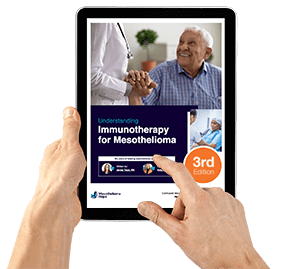About Mesothelioma Cancer Vaccines
Vaccines for mesothelioma help the body to target and destroy cancer cells.
Mesothelioma cancer vaccines are a type of immunotherapy, a treatment that creates an anti-tumor immune response by boosting the body’s natural defenses.
No mesothelioma vaccines have been approved by the U.S. Food & Drug Administration (FDA). However, researchers are working to develop and test vaccines in clinical trials to see how they can help patients with mesothelioma.
Download our Free Immunotherapy Guide to learn more about how vaccines and other types of immunotherapy work for mesothelioma.
How Mesothelioma Vaccines Work
At this time, most mesothelioma vaccines are used to treat patients who already have cancer. However, there are some studies testing whether mesothelioma vaccines can be used to prevent this disease altogether.
Treating Mesothelioma
Vaccines treat cancer by boosting the body’s immune response. Though the immune system normally kills bad or harmful cells, cancer cells can still sneak past the body’s defenses.
The concept behind vaccines for mesothelioma treatment is that cancer cells contain substances called antigens. Antigens are substances that trigger an immune response.
Antigens are not present or less present in healthy cells. Mesothelioma vaccines allow the body to recognize and react to these antigens so the cancer cells can be destroyed.

“These mesothelioma vaccines are very promising because they can help reduce toxicity and increase the effectiveness of the drugs we can use.”
Preventing Mesothelioma
Many preventative vaccines work by injecting an antigen before someone develops cancer or another disease. Research is being done to see if a preventative mesothelioma vaccine could work.
For example, a 2020 report published by the University of Hawai’i looked at how a treatment vaccine called TVAX could possibly be used to lay the framework for prevention by targeting cancer antigens.
Other cancer vaccines have already been approved for human papillomavirus (HPV) and hepatitis B — two diseases can cause other types of cancers.
We can help you enroll in clinical trials to receive mesothelioma vaccines. Contact us now to get started.
Types of Mesothelioma Cancer Vaccines
Cancer vaccines generally work by boosting the immune system’s ability to recognize and destroy mesothelioma cancer cells, though they are relatively new and still being researched.
Cancer vaccines generally fall into two main categories:
- Preventive (prophylactic) vaccines: These are designed to prevent certain types of cancer by targeting the materials, viruses, or bacteria that can cause them.
- Therapeutic vaccines: These are intended to treat existing cancer by stimulating the immune system to recognize and attack cancer cells. Therapeutic cancer vaccines aim to improve the body’s natural defenses against cancer, either by using specific tumor antigens or by boosting the immune response.
Scientists are exploring different approaches to develop effective cancer vaccines, such as:
- Dendritic cell vaccines: These preventive vaccines use immune cells called dendritic cells to present cancer antigens, triggering an immune response against the cancer.
- Gene-based vaccines: These vaccines deliver genetic material into cells to trigger the production of antigens and an immune response.
- Peptide vaccines: These therapeutic vaccines use specific protein fragments (peptides) from cancer cells to stimulate the immune system’s response.
Researchers are dedicated to advancing these areas of study to create effective cancer vaccines for the treatment and prevention of mesothelioma and other types of cancer.
Mesothelioma Vaccines Being Tested in Trials
To provide a better understanding of how mesothelioma vaccines work, our team has compiled notable ones being studied in clinical trials.
Galinpepimut-S Vaccine
Galinpepimut-S (GPS) is a protein-based vaccine that targets the Wilms Tumor 1 protein, an antigen often found in mesothelioma cells.
GPS, when combined with another immunotherapy drug Opdivo® (nivolumab), has improved life expectancy for patients with pleural mesothelioma.
In a 2023 phase I clinical trial, GPS and Opdivo tripled overall survival — from 9 months to 27.8 months — in patients diagnosed with pleural mesothelioma. Notably, these patients had already been treated with chemotherapy, but their cancer did not respond or had come back after treatment.
HSV-1716 Vaccine
In 2022, a study published in Lung Cancer Journal explored the use of a virus-derived vaccine called HSV-1716 to treat pleural mesothelioma — and showed promising results.
HSV-1716 is an oncolytic virus developed from the herpes virus. This type of virus has the ability to invade and destroy cancerous tumor cells while sparing healthy cells.
About half of the patients’ mesothelioma tumors stopped growing temporarily within around 8 weeks of getting the vaccine. The treatment caused very few side effects, making it easier for patients to tolerate.
A specialist can determine whether you’re eligible to get mesothelioma vaccines being tested in clinical trials. Use our Free Mesothelioma Doctor Match to find a specialist near you.
MV-NIS Vaccine
MV-NIS is a mesothelioma vaccine created from the measles virus. Clinical trials are underway to see if intrapleural measles virus therapy is an effective way to treat pleural mesothelioma.
Investigators propose that the measles vaccine will:
- Allow the measles virus to infect and destroy cancer cells
- Avoid injuring any healthy cells in the process, unlike other cancer treatments
- Trigger an immune response to help destroy tumor cells
Studies of the MV-NIS vaccine have found that cancer stopped spreading in 67% of patients, helping them to survive for 15 months on average.
Poly-ICLC Vaccine
Poly-ICLC (also known by the brand name Hiltonol®) that helps the body build an effective immune response to kill cancer using RNA. These types of vaccines send signals into immune cells so mesothelioma can be destroyed.
New York’s Mount Sinai Health System is currently leading a clinical trial into how poly-ICLC can help pleural mesothelioma patients.
Those qualified to join the trial will receive an injection of the poly-ICLC vaccine right into a tumor so it’s easier to kill. Then, the patient will undergo mesothelioma surgery to remove the cancer.
Stem Cell Vaccine for Mesothelioma
A stem cell vaccine for mesothelioma cancer is being developed that’s shown promise in animal models.
The vaccine process involves:
- Extracting induced pluripotent stem (IPS)
- Genetically remodifying the IPS cells in a lab
- Creating an immune response by injecting the body with the modified cells
This type of vaccine could prove useful for many types of cancer, including mesothelioma, according to Dr. Joseph Wu, researcher and study director at Stanford University. However, a stem cell vaccine has yet to be tested in human clinical trials.
UV1 Vaccine
One ongoing clinical trial involves a protein-based vaccine called UV1. In this study, recipients received the UV1 vaccine as well as two immunotherapy drugs to stimulate the immune system: Opdivo and Yervoy® (ipilimumab).
As a second-line treatment for patients, the UV1 mesothelioma vaccine works by stimulating cytotoxic T-cells to spot and destroy cells that express telomerase, which is over-expressed in cancer patients.
In phase II of the UV1 clinical trial, patient life expectancy improved by 27%, and nearly one-third of patients experienced partial or complete remission.
Contact our Patient Advocates to get help enrolling in clinical trials for mesothelioma vaccines.
Mesothelioma Vaccines and the FDA Approval Process
The FDA has not yet approved any mesothelioma vaccines. However, the FDA granted the UV1 vaccine Fast Track designation in February 2024, which could help the vaccine move faster through the research and review process. This could help the vaccine reach patients sooner if it passes each step of the FDA approval process.
Mesothelioma cancer vaccines must go through the following steps to obtain FDA approval:
- Discovery and development: Research for the vaccine begins in the lab.
- Preclinical research: The vaccine undergoes animal and lab testing to answer basic questions about safety.
- Clinical research: Researchers test the vaccine on people to ensure safety and efficacy.
- FDA review: FDA review teams will examine the submitted data about the vaccine and decide whether to approve it.
Side Effects and Risks of Cancer Vaccines
As with all treatments, cancer vaccines may cause side effects. Side effects will depend on the type of vaccine and usually only last a short time.
Common side effects associated with cancer vaccines include:
- Chills and fever
- Dizziness
- Fatigue
- Headache
- Inflammation at injection site, including swelling, pain, redness, or rash
- Muscle aches
- Nausea and vomiting
Get Help Finding the Best Treatments for You
The news of a mesothelioma diagnosis can quickly overwhelm and you and your family. That’s where Mesothelioma Hope comes in.
For over 25 years, our team has helped mesothelioma patients and their loved ones find personalized medical guidance, financial assistance, and supportive care.
Call (866) 608-8933 to reach a Patient Advocate or use our Free Doctor Match service to get started.
Mesothelioma Vaccine FAQs
What is the injection for mesothelioma?
Mesothelioma vaccines are still in the experimental stages.
One of the promising approaches involves using dendritic cell vaccines. Dendritic cells are extracted from the patient’s body, exposed to mesothelioma tumor antigens (substances that the immune system can recognize as foreign), and then injected into the patient.
This process aims to “train” the immune system to recognize and attack mesothelioma cells more effectively.
Another approach under investigation is the use of peptide vaccines. These vaccines are designed to introduce specific peptides (short chains of amino acids) that are present on mesothelioma cells.
The immune system is then stimulated to recognize and attack cells displaying these peptides.
How close are we to a cure for mesothelioma?
We become closer to a cure for mesothelioma each year as scientists study newer treatments like vaccines and how to improve existing ones.
Vaccines are currently not a full mesothelioma cure, but studies have suggested that they can greatly improve patients’ survival time and quality of life.
Is there a vaccine for asbestos diseases?
Mesothelioma vaccine therapy is the new type of drug or treatment option for this type of asbestos-related cancer, though it’s still being tested in clinical trials.
Like immunotherapy, vaccines for mesothelioma cancer aim to improve your immune system’s ability to defend against current cancer cells in the body and prevent future growth.
Will there be a cure for mesothelioma in the future?
Possibly. Right now, most mesothelioma treatments help patients just live longer. For example, studies have shown that mesothelioma vaccines can stabilize disease progression.
However, additional research is required to determine whether mesothelioma vaccines and other treatments will totally cure this cancer.





